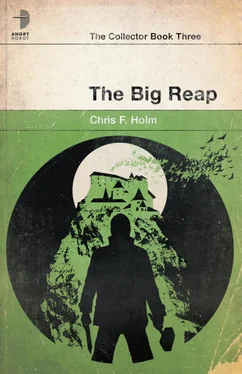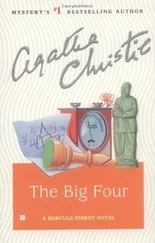Chris Holm - The Big Reap
Здесь есть возможность читать онлайн «Chris Holm - The Big Reap» весь текст электронной книги совершенно бесплатно (целиком полную версию без сокращений). В некоторых случаях можно слушать аудио, скачать через торрент в формате fb2 и присутствует краткое содержание. Город: Nottingham, Год выпуска: 2013, ISBN: 2013, Издательство: Angry Robot, Жанр: sf_fantasy_city, на английском языке. Описание произведения, (предисловие) а так же отзывы посетителей доступны на портале библиотеки ЛибКат.
- Название:The Big Reap
- Автор:
- Издательство:Angry Robot
- Жанр:
- Год:2013
- Город:Nottingham
- ISBN:9780857663429
- Рейтинг книги:5 / 5. Голосов: 1
-
Избранное:Добавить в избранное
- Отзывы:
-
Ваша оценка:
- 100
- 1
- 2
- 3
- 4
- 5
The Big Reap: краткое содержание, описание и аннотация
Предлагаем к чтению аннотацию, описание, краткое содержание или предисловие (зависит от того, что написал сам автор книги «The Big Reap»). Если вы не нашли необходимую информацию о книге — напишите в комментариях, мы постараемся отыскать её.
Sam Thornton has had many run-ins with his celestial masters, but he’s always been sure of his own actions. However, when he’s tasked with dispatching the mythical Brethren — a group of former Collectors who have cast off their ties to Hell — is he still working on the side of right?
File Under: Urban Fantasy [ Soul Solution | Secret Origins | Flaming Torches | Double Dealing ]
The Big Reap — читать онлайн бесплатно полную книгу (весь текст) целиком
Ниже представлен текст книги, разбитый по страницам. Система сохранения места последней прочитанной страницы, позволяет с удобством читать онлайн бесплатно книгу «The Big Reap», без необходимости каждый раз заново искать на чём Вы остановились. Поставьте закладку, и сможете в любой момент перейти на страницу, на которой закончили чтение.
Интервал:
Закладка:
For a moment, there was a tinny, echoing nothing — like dropping off from anesthesia — and next thing I knew, I was in a tipped-over faux-leather office chair, tasseled loafers aimed soles-to-ceiling, and the back of my head smarting something fierce from where it smacked against the institutional vinyl tile floor. Been happening more and more of late — the body-hopping was getting easier, the force previously required now enough to knock folks back. Even the subsequent meat-suit nausea hasn’t been so bad, I think. But as soon as the thought arced across my mind, Mr. CEO here’s stomach revolted, and I barely made it to the dented metal trash bin beside his desk before his lunch of enchiladas came up.
It was just past 7am in Guam when I dropped my quarters into the payphone. That made it 4pm or so Texas-time. Sunlight slanted oven-hot through vinyl-blinded windows. Beyond them, ten enormous pill-shaped Kevlar tents studded the three football-fields of fence-looped gray dirt in two rows of five, with paved paths bleached pale gray linking them together like a circuit board. At the outside end of every oblong structure, nearest the perimeter fence, was a small paved yard — some empty, some milling with brown-skinned men. If there were women, they weren’t housed within sight of my new meat-suit’s office, which appeared to be housed in a low-slung building of more quotidian design than the tents outside — less funky marshmallow prison, more dull-as-dirt industrial park.
I couldn’t help but notice it was surrounded by razor-wire just the same.
Ortiz. Larry Ortiz, so said the nameplate on his desk, at any rate. If I had to guess, I’d say the Ortiz was to appease the critics of the facility, who claimed its very existence was racially motivated — and the Larry was to appease the white-faced white-hairs who kept on funding it and didn’t want anybody “too ethnic,” in their parlance, to be in charge. A portly man in a too-tight dress shirt, unbuttoned at the collar, and iron-creased jeans. The lone picture on his desk showed two smiling kids, a smiling wife, and a round, graying, florid man in a Stetson and cowboy boots, a chambray shirt and jeans.
Me, I figured.
I considered paging Ortiz’s admin or secretary or whatever, but I didn’t know if he had one. Plus, his office phone was so damned complicated, I couldn’t figure out how. So instead, I marched straight out of his office, and declared to the perfume-drenched pile of teased-up Texas hair and tits behind the desk outside, “I need to see Guerrera. Now .”
I half-expected her — or the guards she summoned to escort me — to ask me why. To tell me we had three Guerreras in custody, and they didn’t know which one I meant. To flat-out refuse to take me to him. But they didn’t.
Sometimes, it pays to be the boss.
Nor did they take me to his cell. They brought Guerrera to me. Or rather, had him waiting in an interrogation room when I arrived — handcuffed to a table, an empty chair opposite for me. There was no cop-show two-way mirror. Just a table, two chairs, a corner-mounted video camera, and one very frightened man. And then me.
The two guards who’d escorted me made to enter the room, but I waved them off without a word. They took up posts in the hall, on either side of the door, which I promptly shut.
Guerrera did not look well. His skin was pale and sheathed in sweat. His exposed flesh had the look of having been picked at, his forearms furrowed with fingernail scratches, a constellation of tiny half-moons on his cheeks a scabrous red. His hair was a mangy shock of white, as if he’d been pulling it out in clumps. His eyes darted around the room — vigilant, paranoid. His fingers drummed a rat-a-tat atop the metal table. Sitting still — being chained — was torture for him, it was clear. His finger-tapping soon spread to his feet, and as I fixed my gaze upon him, he began to rock back and forth, his breath coming so quickly through gritted teeth I actually worried for his health.
Then I remembered he was human garbage, responsible for no shortage of deaths, dismemberments, and drug-dependencies in his tenure with the Xolotl Cartel.
It helped, a little.
I approached the table. He watched — nervous, rapt — as I dragged the cheap metal chair over to the corner of the room, its legs squealing against the painted concrete floor. I said nothing to him, nor he to me. Then I climbed atop the chair and, after a moment’s fiddling, yanked the wire out of the security camera. His eyes went wide with fear of a different sort. Immediate, explainable. Human in origin. In his mind, I was a bad man, here to do bad things to him. Guerrera understood that all too well. Though usually, he was on the other side of the table. Or the ax. Or the flamethrower.
The man had quite the colorful file. Made whatever scared the piss and pigment out of him twice as oogly-boogly in my mind as I might have thought it otherwise.
When I returned from the corner, leaving the chair behind and circling the table toward him, he spat and said, “I tell you nothing .”
“That’s all right,” I said. “You don’t have to.”
My hand found his chest and reached inside. As my fingers wrapped around his corrupted soul, his eyes widened yet further — his face a mask of pain and disbelief.
The interrogation room fell away, replaced by a swirling black morass and a lifetime of experiences. A village, slaughtered. Countless women, raped and killed. Enough coke to fell an army, blown off the naked skin of men and women both. A young boy who looked like him, into whose bed he snuck a time or two while his wife slept. And countless nights of Gulf breezes and swanky parties, on yachts, in palaces, on island beaches. As if this bastard hadn’t a care. As if his conscience weren’t touched by all he’d done, his heart full in those moments of laughter and light.
Again and again, though, one memory bubbled unbidden to the surface of his mind. Of a tunnel — dirt and darkness. Of men and women screaming. A low growl. Teeth gnashing in the black. The popcorn pop of gunfire. The metallic tang of discharged firearms and blood. Cool, clean air as the dirt above gave way to starry night, but still, the creature followed. And then the wet, sticky sound of flesh ripping from bone.
And then running. And then here.
One phrase over and over, a sturdy stitch that held the tattered scraps of memory together: El Chupacabra .
I released his soul from my grasp. He collapsed, gasping, to the table, tears streaming down his cheeks. Tears streamed down mine as well, and my borrowed flesh trembled with the fresh hell of its doubly borrowed memories. Like Guerrera, I couldn’t stop the tears. My strength comes from knowing not to even bother trying.
The two of us sobbing, I slammed him backward in his chair once more. His eyes were so full of fear — all the more so for seeing the echo of it on my borrowed cheeks. Cheeks built for smiling, not for this. It was clear to me he didn’t understand. Why I was crying. What it was we shared.
I didn’t need him to.
What I needed was a location.
Memories aren’t like a road map. They’re messy. Partial. Untrustworthy. I needed him to unpack them for me. To make sense of them. So I reached my hand back into his chest and squeezed until he wailed like an injured child. Then I let go and asked him questions. He answered — mostly lies. I squeezed again. And asked again. He changed his tune. Screamed so hard I bet he tasted blood.
It took longer than I expected. An hour, maybe more. But eventually, his answer stayed the same, no matter how hard I pushed. So I stopped.
Then I remembered that little boy, and I pushed a little harder, just for kicks.
It was Guerrera who gave up this rathole bar, and Telemundo who led me to my current meat-suit. A sergeant in the Mexican Army. Once I was through with Guerrera, I spent some time live-streaming the network’s coverage of the body-dump on I-83, trolling for a decent bag of bones to tool around in. Ortiz was far too soft for what I had in store. When this guy — Solares, according to the sewn-on patch on his uniform, since my fifty words of halting Spanish couldn’t keep up with what the well-quaffed talking heads back in the studio — stepped up to the mic, all sinew and barely concealed rage, I knew I’d found my man. Because I didn’t need to know what his words meant to know from his grave expression, his unwavering glare into the camera, that he was promising the perpetrators of this horrible act would be brought to justice.
Читать дальшеИнтервал:
Закладка:
Похожие книги на «The Big Reap»
Представляем Вашему вниманию похожие книги на «The Big Reap» списком для выбора. Мы отобрали схожую по названию и смыслу литературу в надежде предоставить читателям больше вариантов отыскать новые, интересные, ещё непрочитанные произведения.
Обсуждение, отзывы о книге «The Big Reap» и просто собственные мнения читателей. Оставьте ваши комментарии, напишите, что Вы думаете о произведении, его смысле или главных героях. Укажите что конкретно понравилось, а что нет, и почему Вы так считаете.











